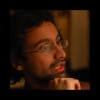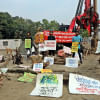Bashundhara felling trees: Why make the city less livable?

"Cholona Bashundhara jai!"—these words are impossible to get out of one's head. The jingle used to accompany images of idyllic green suburbs, with townhouses, gardens and a sparse population.
There aren't many private developments like the Bashundhara Residential Area in Dhaka. Usually they are decidedly concrete jungles with no spare inch for any sort of greenery. (Is there even such a thing as a tree in Niketan?) But for a family enterprise that tends to demonstrate plebeian aesthetic taste, there was an undeniable charm in the canopy of aged trees that shaded Bashundhara's main road. There were majestic rain trees, and Krishnachuras that would burst into bright orange every spring—just about this time of the year!
But now all that is history. Over the past two weeks, the Bashundhara authorities have felled almost all the trees along its main road. Sayem Sobhan Anvir Road is mostly bare, but there are other trees on other roads that remain marked for removal with an ominous X.
Let's be clear: this isn't an aesthetic problem. Each of the last 10 months have been the hottest on record. June 2023 was the hottest June on record. July 2023 was the hottest July. In February 2024, the 12-month average temperature was 1.52˚C higher than pre-industrial levels. What this means, if you're struggling with the maths, is that it's BLOODY HOT.

It's hot enough to disrupt global weather patterns; to cause serious health problems; to induce a stroke; to kill stray animals. April is the hottest month of the year, and the difference between the temperature in Dhaka and surrounding areas has been known to be as much as 7˚C. The difference is green spaces. Trees versus concrete. Trees keep temperatures down, not just by taking carbon from the air, but also by shielding the ground from the sun.
It should be criminal for trees to be felled at this rate in the year 2024. Many of the lost trees must have been over 50 years old—older than Bashundhara; most were at least 20-30 years old. Unfortunately, there is no law governing the felling of trees on private property in Bangladesh. (Even if the said property is the size of a small city.) Elsewhere in Dhaka, the city corporation might intervene to stop such a move, and perhaps even press charges (when it isn't the city corporation itself doing the cutting, that is). But the DNCC has no authority over Bashundhara.
Why did the trees have to go?
It's difficult to get an answer regarding this. Bashundhara is neither easy to contact, nor forthcoming with answers. Two reasons seem to be kicking around. The first is that the roots of these trees are weak, and prone to falling or shedding branches, therefore posing a security hazard to passing cars and people.
Trees falling is not unheard of. These incidents happen not just in Bashundhara, but all around the world. There have been no fatalities due to falling trees in Bashundhara so far, but that doesn't mean we shouldn't be concerned.

But consider other fatal accidents in Dhaka: debris falling from construction sites; cranes keeling over and killing a family in their car; or road accidents, which kill thousands every year. The solution to road accidents is not to evacuate roads, and the solution to falling girders is not to stop building flyovers. Similarly, cutting down trees is no solution to the risk of falling trees.
Trees everywhere should be properly inspected and maintained, and besides the few infested or weakened trees which might have to be removed, the rest can be treated, if needed, to remain strong. The idea that hundreds of trees need to be chopped down to prevent them from falling is simply absurd.
The more likely reason for clearing the trees is that the authorities would like to widen the road. If there's one greater public villain in Dhaka than heat, that would have to be traffic.
Bashundhara has traffic problems. But the biggest one is at Bashundhara Gate, which is jammed every day, all day, because of an ineffective separation of motorised and non-motorised vehicles.
Moreover, every few years, the authorities seal off more and more options for non-motorised traffic to enter and leave the neighbourhood. Ghatpar was an excellent alternative route, and also a favourite hangout spot for students. If the authorities wanted to improve traffic conditions, there are several things that could be done before cutting down trees.

Who are we to tell them what to do?
But it's fair for the Bashundhara authorities to retort: this is their land, these are their trees; who are we or anybody else to tell them what to do? And they're right. Let's not pretend we live in a moral society, and that everybody, especially rich people in positions of power, do act in the interests of society at large. Why single out this particular act, especially when they're not even breaking the law?
Without getting into the dubious process by which low-lying areas and conservable flood-flow zones were acquired, filled and developed, this is probably a moment to reflect on the laws on cutting trees. In 2022, the cabinet approved a draft law that would require anyone to take permission before cutting down trees on a private property. That move was chaired by the prime minister herself. The law was never put into effect, but perhaps it's time to reconsider.
But more importantly, this is a moment for residents to consider what they've paid for. When most of Bashundhara's current residents were moving into the area, i.e. during the past two decades, they saw a Bashundhara that was more beautiful and liveable. This was in line with Bashundhara's marketing. But now, after the plots have been sold and resold, the buildings constructed and apartments occupied, residents no longer have what they paid for.
Meanwhile, the new areas of Bashundhara are still relatively green. The new roads are still lined with trees. It might induce buyers looking for green spaces. But should anyone believe that the area will stay green? Once these blocks are occupied, and when the traffic intensifies, what's to keep the authorities from cutting down those trees? As a buyer or renter, I can't trust that this neighbourhood will be a liveable one in the future.
It's in the long-term interest of the Bashundhara authorities to invest in the liveability of the project. Bashundhara itself would be the biggest gainer, in the long run.

But who plays the long game anymore?
But who really cares what our future generations will see? And is it too late to care? I don't know. The question is whether Bashundhara dwellers will get tired of the authoritarian-style management and change their tune to "Cholona onno kothao jai!"
Naushad Ali Husein works in the development sector. He can be reached at [email protected]
Views expressed in this article are the author's own.
Follow The Daily Star Opinion on Facebook for the latest opinions, commentaries and analyses by experts and professionals. To contribute your article or letter to The Daily Star Opinion, see our guidelines for submission.

 For all latest news, follow The Daily Star's Google News channel.
For all latest news, follow The Daily Star's Google News channel. 








Comments